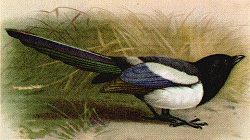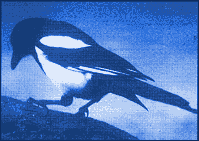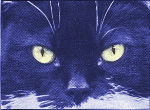|
|
|
|
|
|
|
|
|
Coursers' blood is boiling over critics
 |
| WRONGLY blamed. Sean says moggies,not magpies- are
the main culprits for the decline of songbirds. |
A weekly appreciation of nature.
Sean Wood
LAST week's article about hare coursing
certainly caused a stir in the blood sports world.
'You don't know what you're talking about,' and 'You're not a 'real' countryman'
were just two of the comments aimed at yours truly. To the latter caller
I responded with: "So I need to chase animals with dogs before I qualify?"
Prudence declares I cannot repeat his parting shot in a family
newspaper, but in a nutshell he said: "Go away you fatherless idiot."
Sticks and stones and all that, is what I say. Anyone who saw the sorry and
very wet spectacle of the Waterloo Cup on the television would surely have
made their own mind up and come to the conclusion that chasing hares with
dogs is downright cruel.
If you recall, the Countryside Alliance
attempted to explain away the pastime as an 'exciting' sport where the dog
and hare pit their skills against one another, with the canine gaining points
for its 'skill'.
If the exponents of coursing were really fair, as they claim, then surely
the event should have been called off because of a waterlogged pitch? On
the news item I watched, the brown hares were doing the front crawl, while
the hunters were obviously doing the doggy paddle. It was a complete farce.
Published research has also shown the coursers have their
facts wrong. Remember they said: "The brown hare is a great pest like
the common rabbit."
In fact, the research suggests that the hare population has halved since
the 1920s.
In Lancashire, naturalists have noted a marked decline from the 1970s, which
continued into the 1990s, resulting in the complete loss of hares from districts
where they were once relatively common.
The Wildlife Trust for Lancashire, Manchester and North Merseyside
says in its magazine Lapwing: "The major loss of hares seems to correlate
with changes in farming patterns. As more farms have specialised in one type
of farming, there has been a tendency away from mixed farms with both pasture
land for livestock and fields with arable crops.
It is thought that this has particularly disadvantaged brown
hares that thrive in areas with a diversity of open habitats.
"Concern that they are decreasing has led to the production of a species
action plan, which will include a count in March this year.
"Taking part will be conservation bodies, farmers and landowners,
and also so-called 'sporting interests.' If you have a few hours you could
devote to counting hares in Lancashire and/or you would like to attend a
training day, please contact Tony Serjeant at the Wildlife Trust on 01772
324129."
Later news items on the day of the Waterloo Cup saw Tony Blair
reiterating his party's manifesto promises to ban hunting with dogs. I live
in hope.
Coincidentally, a reader has entered the debate through a side issue and
I am sorry he does not find me in the mood to compromise.
He wants to know whether he can obtain a licence to shoot magpies
- he, like so many others in the past couple of years - blames the magpie
for the decline of our native songbirds.
It is true and I could not argue that the magpie does kill some birds. However,
let me shout from the rooftops: Your average pet moggie is the real culprit.
Here's the maths. Let us say at a
conservative estimate that for every magpie territory in a built-up area
there are at least 40, 50 or maybe 60 cats. If each cat catches three or
four birds a year, enough said.
To conclude on a much more conciliatory note, Ivan Bell from Old Glossop
says: "I'll agree to differ with your views on blood sports, but I still
enjoy your column, arid by the way I've just heard a woodpecker."
Attitude is common sense
 |
NOT to blame: The magpie. |
EDITOR - May I commend Sean Wood on his common sense attitude
towards magpies?
The Royal Society for the Protection of Birds recently undertook a
study of the part magpies have played in the decline in the numbers of small
birds, the basic conclusion of which was that although magpies do to some
extent predate on small birds, this mainly only occurs during part of April
and May when they are feeding their young.
Although it is upsetting to watch a magpie taking young birds nom the nest,
this is just a small period in a much longer breeding season for most of
the prey species. The rest of the year a magpie's diet mainly consists of
carrion, invertebrates and scraps.
I believe Sean is indeed right to blame the domestic moggy for the decline
in the small bird population. Nowadays with many couples both out at work
all day a cat is seen as an almost self caring pet, turned out in the morning
it is free to expend its predatory instincts.
We take great pleasure in watching the birds feeding in our garden, however
this is marred by the visits from the neighbourhood cats. We are also visited
daily by the sparrow hawk who is much more effective at catching small birds
than any magpie.
Concerned cat owners could perhaps help the bird population by equipping
their moggy with a decent bell to warn of its approach, and the rest of us
could let mother nature take care of her own.
Mrs Margaret Smethurst,
Meadow Lane,
Haughton Green, Denton. |
Hunters help keep hare numbers up
EDITOR - 'Sean Wood in his article 'Declining
hare is hounded for sport', has no time for the views of the Countryside
Alliance, nor would I expert him to give much credenee to the government's
inquiry into Hunting With Hounds under Lord Burns.
Your readers however, might like to read some of the points which this impartial
inquiry made.
The Burns Report agrees the hare population is stable, despite claims from
Deadline 2000 that it's in decline. Although it claims there is 'little or
no need to control overall hare numbers', it admits 'the distribution is
uneven'.
It allows that hares are still locally common and 'damage caused by hares
to crops and trees can be of economic significance to individual growers'.
The report agrees in areas where registered coursing takes place, high numbers
of hares are encouraged. It also claims 'no one argues that legal hunting
or coursing has an appreciable effect on hare numbers', by the numbers killed.
It details coursing's' conservation input, and allows that evidence submitted
indicated that coursing clubs contributed by pubilcising the problems faced
by hares in modern agriculture, and by encouraging planting of game cover
crops. The report states 'in the case of hare hunting and coursing, it seems
clear that those interested in these activities have helped maintain habitats
which are favourable to the hare and to a number of other species'. It admits
that 'hare numbers are maintained at high levels for shooting and
hunting/coursing purposes'. It concludes 'On those estates which favour coursing
a hunt ban might lead farmers and landowners to pay less attention to encouraging
hare numbers. The loss of habitat suitable for hares could have serious
consequences for a number of birds and other animals'.
Mr CT Blanning,
Secretary National Coursing Club. |
Cats not the culprits
 |
SHARP-EYED: But not all cats are keen bird hunters, says
our correspondent. |
EDITOR - With regards to Sean Wood's comments on the effects
of cats on the songbird population, I would beg to differ slightly.
Cats will only catch and bring home birds if these are available ie if an
existing population is present.
Many millions of cats are lazy neutered, and/or indoor cats who never catch
anything but the odd soft toy.
I believe that fragmentation and loss of habitat, and intensive pesticide
fuelled farming, cause far more damage to our songbirds.
Considering that the total area covered by gardens in Britain is larger than
the total nature reserve area, gardens are very important to birds, and all
year round feeding and providing nest areas is very important.
And cat management is also possible. One of my cats is a reasonable hunter
but sleeps in all day goes out all night, and wears three bells. He hasn't
caught anything for a long time.
J Manchester,
Pennine View,
Heyrod, Stalybridge.
[The Advertiser 21/3/02] |
Declining hare is hounded for Sport
 |
IN DECLINE: This drawing of brown
hares comes from Anne McBride's informative Rabbits & Hares (Whittet
Books)
|
AS you read this week's column, over breakfast or a plate of
chips, brown hares are being chased by dogs in the annual Waterloo Cup.
Both the National Coursing Club and the Countryside
Alliance have asked me, in the interests of fair play you understand,
to explain the finer points of hare coursing.
It's OK, carry on eating for now, but just make your own mind up as to whether
the whole charade of 'country sports' is palatable
to you or not.
Let me start: with the notion of fair play. Organised coursing pits two dogs
against one hare, so straight away in my book that is palpably not fair.
Adrian Yalland, senior press officer of the Countryside Alliance, says: Coursing
is one of the oldest field sports and dates back to the ancient Egyptian
pharaohs.
Well, that's all! right then, Mr Yalland, but isn't it a good job that when
poor old Princess Margaret died recently that all of her staff were not interred
with her? That great old Egyptian custom of burying one's retinue alive has
thankfully been consigned to history, hopefully to be followed shortly by
coursing and fox hunting.
He goes on to explain that the purpose of the course is to test the skill
of the dogs and not to kill the hare. Each dog is given points for agility
and stamina but: "The hounds are awarded no points if the hare is caught,
he said.
At first sight that last comment could appear to mean that no points were
awarded at all if the unfortunate hare was caught. However, it most certainly
does not mean that, but rather that no extra points are awarded for a kill.
The next so called 'point of information' beggars belief:" Like the common
rabbit the hare (brown) is a well established pest."
The brown hare is in fact in national decline - research suggests a 50 per
cent drop in numbers since the 1920s - and has never been treated as an equal
with the rabbit. I also know that many farmers enjoy seeing the long-legged
hare loping across their fields.
According to the Countryside Alliance, we should be grateful for the way
they manage areas such as the Leverhulme Estate where the Waterloo Cup takes
place. Their chairman David Midwood says:"These areas are managed to encourage
the hare population to thrive, which also has a significant and positive
benefit on the environment and encourages the growth of rare flora and fauna.
They should be careful with claims like that - after all, do they not realise
that some hunting is prohibited in areas where rare flora are known to
flourish?
Admittedly two dogs chasing one hare may not flatten many orchids, but they
also boast that about 10,000 people attend the Waterloo Cup at Great Altcar
in Lancashire.
It does not take a genius to work out how many flowers
could suffer at the feet of 20,000 shoes.
Besides, it is yet another example of what I call 'inverted conservation'
-protecting and encouraging a species which is then in turn hunted, as is
practised with grouse and pheasants.
Not one to miss an opportunity to gain creditable allies, the Countryside
Alliance quotes RSPCA research in an attempt to persuade us that coursing
is not cruel and that hares suffer no distress. Mr Midwood again: Research
carried out on behalf of the RSPCA showed that 'flight'
is a natural instinct of the hare and a routine response to
danger.
Sherlock Holmes must have been employed
to discover this amazing fact - I could never have worked it out for
myself.
Let's face it, the hares are hardly likely to have it in their genetic make-up
to stand up and say 'It's a fair cop, boys,' before allowing themselves to
be ripped to pieces. Please forgive my hint of sarcasm but I have had over
20 years of countering the outdated rubbish which
is spouted about field sports. But in the interests of fair play, the following
is how the Countryside Alliance would describe my writing: Unbalanced,
inaccurate, misleading and unsubstantiated."
What do you think? |
Monkeying about with the hunt debate!
AFTER last week's pastoral diversion,I am drawn again to the
controversy on hunting wild animals with dogs, not least because both the
editor and myself have been busy reading letters and fielding phone calls
about my comments.
Some of these with views opposed to my own, although moved enough to write,
ask for anonymity. If they want to speak out, then surely they should have
the courage of their convictions?
You may recall that the hare coursers of Waterloo were adamant in their claim
that the emphasis of coursing was nothing to do with 'killing the hare' while
admitting that this sometimes happened.
Well I can report that on the first morning of the 'event', a hare was killed
very early on and the kill was cheered by many of the onlookers. Let them
explain that one away. Two readers, Brian Shelmerdine and Joyce Bentley,
admirably reflected the opinion of 90 per cent of respondents.
Brian said: "Thanks very much on behalf of all sane people for putting forward
sensible arguments to counter the false assertions of the coursing fraternity.
They are simply doing it for the fun of it, but probably don't like to admit
it. Blood lust, that is all it amounts to. It is cruel, they must know it
is cruel and that the hares suffer; they cannot possibly think otherwise."
Joyce echoed these thoughts and added a few of her own. "I heartily
endorse your comments on the cruelty of field sports. I notice with wry amusement
that those who participate in field sports always give some sort of
'reason' why such abominable activities are necessary -
'keeping down vermin, a service to the community etc'
and never the real reason, which is of course that they enjoy it."
While the debate has raged it occurred to me that an examination of the word
sport may provide some answers.
The following is taken from the John Bull edition of the New English Dictionary
published in 1932 and although there is no mention of the history of the
word being attached to 'field' or 'blood', it provides some fascinating talking
points.
'Sport (short for disport) Diversion, amusement; fun, jest, pleasantry. To
play, to divert oneself; to trifle, to jest, to make merry (with a persons
feeling etc). (Biol) To vary remarkably from the normal type. To wear or
display in an ostentatious manner. One who acts fairly towards opponents.'
The latter definition almost tempted me into a sarcastic game of semantics
- you know the sort of thing: "Youcan't be a real sport if you take part
in field-sports, because real sports would only set one dog after one
hare."
But enough of that, it is a serious ssue, which brings me to the letter from
Nik Barner of Glossop, which possibly makes a monkey
out of me.
Oh yes, if you step into the kitchen, sometimes the heat catches you by surprise.
Nik lulled me into a false sense of security with his first few paragraphs...
I have been a shooter for over 40 years - in the past I have shot brown hare,
but like most people in areas of low hare density don't any more."
Perfectly reasonable Nik, but we are not talking about shooting, we are debating
the hunting of animals with dogs. And I have to say here that I am not against
shooting for the pot.
Nik went on to disagree with my notion of 'inverted conservation' and claimed
instead that without game bird management, only 'relict' populations would
survive. Which is possibly true, but not the point.
But Nik landed with a sucker punch when he concluded his letter with: "By
the way, I once saw you hunting with an eagle, what was that after?"
Apart from having a long memory, Nik was right - 20 years ago I did accompany
a falconer friend with his golden eagle and, yes, the eagle was 'after' hare.
So did Nik make a monkey of me? Let me know what you think. In the meantime,
just remember ·that old proverb (made up today): 'If you want to see
where you are going, don't let monkeys climb on your car.' |
|
|
|
|
|
|
|
|
|
|




